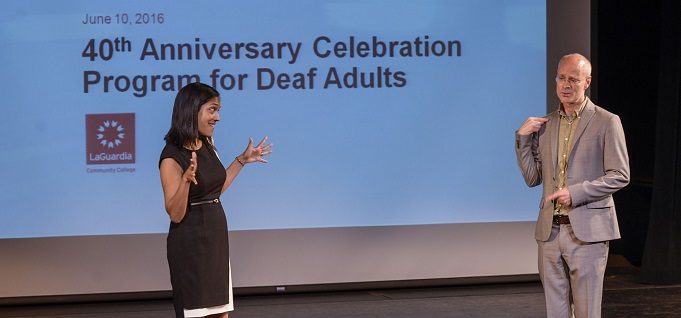Opening more doors for deaf, hard-of-hearing students
By AACC 21st Century Center Staff
February 23, 2017
A new program within LaGuardia Community College’s Program for Deaf Adults helps students get on the path to college.
LaGuardia Community College’s (LGCC) Program for Deaf Adults has broken a lot of ground. The 40-year-old program is the largest, most comprehensive post-secondary program for deaf and hard-of-hearing students in the greater New York metropolitan region.
The program recently graduated its first students to earn their high school equivalency diplomas through the National External Diploma Program (NEDP), which is meant to provide an alternative pathway to the diploma. This is the first-ever implementation of NEDP through the use of American Sign Language (ASL).
“Once again, our Program for Deaf Adults is pioneering pathways to help narrow education and earnings gaps between deaf and hard-of-hearing persons as compared with their hearing counterparts,” LGCC President Gail O. Mellow said in a press release. “These graduates are now ready to pursue their college degrees, so I hope that the next time I shake their hands will be when they earn their associate’s degrees from LaGuardia.”
The two graduating students—Channel Arthur and Pamela Manzueta—finished high school with Individualized Education Program (IEP) diplomas. That meant that in order to attend college or qualify for many jobs, they needed to earn high school equivalency diplomas. However, they had trouble passing the high school equivalency test.
“For many members of the deaf community, ASL is their first and primary language. As a result, coursework or tests that rely on complex written prose, such as the high school equivalency exam, can be challenging,” said Lakshmi “Sasha” Ponappa, Director of LaGuardia’s Program for Deaf Adults. “The fact that we are able to integrate ASL in a meaningful way through NEDP offers many built-in advantages for our students.”
Both Arthur and Manzueta plan to enroll at LaGuardia to pursue their associate degrees, in the near future.
Deaf and hard-of-hearing adults have lower rates of high school and college graduation, according to data. Relatedly, they have higher rates of unemployment and lower family incomes, compared to the general U.S. population.
“Channel and Pamela, like many of our deaf and hard-of-hearing students who have taken the high school equivalency exam but not passed it, were extremely hard working and held high school skills, but had difficulty expressing those skills in the format of the test,” said Sue Livingston, a professor in the Program for Deaf Adults, and in LGCC’s Department of Education and Language Acquisition. “Unfortunately, these challenges are a cause of educational and earnings disparities among the deaf and hard-of-hearing population.”
The pilot program at LGCC was provided tuition-free, with funding and support from several sources. New funding is being sought in order to continue and expand the NEDP program. Staff also are looking into the possibility of administering the program remotely to reach more students.
Get more information from LGCC on this program. And continue the conversation at LinkedIn.



